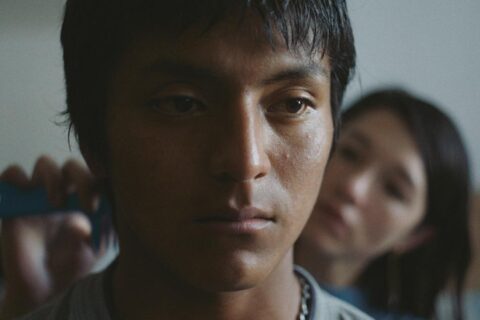Ecuador, where Ana Cristina Barragán’s The Ivy (2025) hails from, is one of the northernmost South American countries, glimpsing up towards Mexico; the film also resembles that country’s edgy and difficult 2010s cinema.
With its DOP Adrián Durazo having worked on Carlos Reygadas’s Our Time (2018) and his partner Natalia López Gallardo’s Robe of Gems (2022), the connection is concrete as well as apt: it’s a film about an uncomfortable topic, shot in an uncomfortable way, with the characters revelling in taboo-breaking behaviours.
Following her work in The Untamed (Amat Escalante, 2016) and Piaffe (Ann Oren, 2022), Simone Bucio hypnotically commands the lead role as Azucena, a troubled woman in her early 30s whose child-like mannerisms and distracted gazes give a profound impression of arrested development. The other primary character, Julio, played by non-professional Francis Eddú Llumiquinga, is spending his final teenage years in the orphanage he’s resided his entire life, and conversely seems better-adjusted, yet ready for belated change, fresh encounters, new mistakes.
Their trajectories surprisingly cross when, after a period of spying on him from a playground outside the orphanage, Azucena strides over to Julio and his friends from the home on a balmy afternoon, and manages to ingratiate herself with them. With the young and attractive light-skinned woman now fraternising with this all-male group of indigenous descent, the latter party know this is an unlikely show of interest, but are too intrigued, and likely attracted to her, to care all that much. Azucena’s gradual social mixing leads to her eventually taking them out bowling, and then to her apartment, with the viewer feeling a growing sense of where this could all be leading. Azucena evidently is making calculated manoeuvres, but both the audience and Julio’s group seem to be collectively questioning “why?”
Indicators from Azucena’s life do congeal: she cares, dresses and bathes her elderly grandfather in the early scenes, whilst remaining tensely standoffish in her mother’s presence. At a routine check-up, her doctor casually makes a reference to her having given birth. And most tellingly, she constantly rewatches a grainy VHS of her appearance at a gymnastics competition, her hesitation on a balance beam suggesting symbolic import. Still, our emotional reciprocity arises more from Bucio’s performance with her sensitive gradations of body language, and the intimate camerawork, than these scant contextualising details of her backstory. These explanations from her personal life are skeletal in what they ultimately convey, yet are forced to carry disproportionate weight to justify character motivation later on.
Julio notices the particular attention Azucena grants him, and seems comfortable when they’re alone together. But the teenager’s romantic interest is suddenly blighted when she claims that he is actually the son she was forced to give up, after her gymnastics instructor sexually assaulted her. The film concludes ambiguously with the two characters travelling to the city’s outskirts, where a dormant volcano lies, and they seem to test, but ultimately affirm, their connection. Other early reviewers have been more convinced, but there’s room left in Barragán’s screenplay to doubt Azucena is telling the complete truth — yet there’s a poetic resolution in how her climactic admission provides closure for both characters.
Beyond this charged tête-à-tête, The Ivy doesn’t fully satisfy, even as its central mystery keeps us curious. Barragán miscues by taking us from an emotionally nervy first two acts into a closing one where catharsis comes with a soft touch, rather than spiking or maintaining the tension. It’s a formally luscious experience that begins feeling vaporous once we assess how its composite elements fit together — or don’t. But with her previous features at Rotterdam and San Sebastián now leading her to Venice, Barragán is on a clear forward path, developing her craft and reaching more clarity with every step.
David has pursued film criticism for almost his entire adult life, and ain't tired of it yet.
